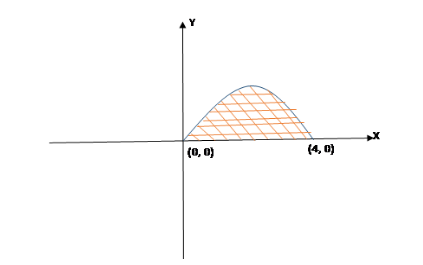Question
Question: The area bounded by the curve \[y = 4x - {x^2} \] and the X-axis, is A. \[ \dfrac{{32}}{3} \] sq.u...
The area bounded by the curve y=4x−x2 and the X-axis, is
A. 332 sq.unit
B. 731 sq.unit
C. 732 sq.unit
D. 334 sq.unit
Solution
Hint : We apply the application of integrals to find the area of the given curve and axis. Equation of X-axis is given by y=0 . By using the given curve and equation of X-axis we find the limits of the integration. Solving the obtained definite integral we obtained the required area of the given region. We can represent the above region in a plane.
Complete step-by-step answer :
Given, the curve y=4x−x2 ---- (1)
As we know the equation of X-axis is y=0 ----- (2)
Substituting equation (2) in equation (1) we get,
y=4x−x2
⇒4x−x2=0
⇒x(4−x)=0 (Using zero product property)
⇒x=0 and x=4 .
Using this we draw a diagram to show the region bounded by the curve.

The curve cuts the X-axis at (0, 0) and (4, 0).
So we can see that the limit of x is from 0 to 4.
Hence the required area in the interval [0, 4] is 0∫4ydx .
⇒0∫4(4x−x2)dx
Split the integral,
⇒0∫44xdx−0∫4x2dx
Take constant outside the integral,
⇒40∫4xdx−0∫4x2dx
Integrate with respect to x.
⇒=4[2x2]04−[3x3]04
Applying lower and upper limits,
⇒24[42−0]−31[43−0]
⇒24[16−0]−31[64−0]
⇒32−364
⇒396−64
⇒332 sq.uint.
Hence, the area bounded by the curve y=4x−x2 and the X-axis, is 332 sq.unit.
So, the correct answer is “Option A”.
Note : Remember that the equation of X-axis is given by y=0 . The equation of Y-axis is given by x=0 . Using the given curve or any equation we find the limits and afterwards we solve it. In the definite integral the integration constant cancels out. Similarly we can find the area bounded by the curves, parabola, circles etc.… In all cases the method is the same as above.
